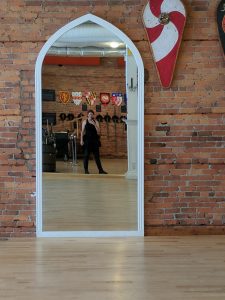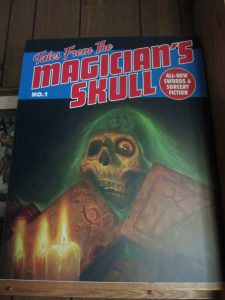Writer Chat: Setsu Uzume
 I’m always on the lookout for talented new sword-and-sorcery writers, or at least new to me, and I stumbled upon the work of Setsu Uzume in an issue of Grimgark magazine. Shortly after I invited Setsu to contribute to Tales From the Magician’s Skull issue 2, which will be available in print form any day now, and a few days ago we sat down, via e-mail, to discuss writing and fiction and all that good stuff. Without further ado, here’s what we had to say:
I’m always on the lookout for talented new sword-and-sorcery writers, or at least new to me, and I stumbled upon the work of Setsu Uzume in an issue of Grimgark magazine. Shortly after I invited Setsu to contribute to Tales From the Magician’s Skull issue 2, which will be available in print form any day now, and a few days ago we sat down, via e-mail, to discuss writing and fiction and all that good stuff. Without further ado, here’s what we had to say:
First, why don’t you give us a little background about yourself and your work.
I tumbled around a lot before winding up as a writer. When I was tiny, I wanted to be some kind of itinerant hero like Xena. I did a lot of theater, playing male and female characters, but when I auditioned for a specialized high school to pursue acting professionally, I didn’t get in. I figured, OK, I’m always doing bit parts and side roles so I’m either not cute enough or not femme enough to be a star. However, I had a strong martial arts background, so decided to do stunts instead. Then The Matrix came out and the shift to CGI didn’t bode well (plus, if you were gonna double for women in those days it was all rape scenes all the time), so I put that dream on hold while I went to college. Parallel to all of this was a love of story and storytelling, and I was starving for characters that looked and thought like me. So here we are.
If you were going to direct readers to your fiction, what would you most like them to see?
Grimdark Magazine is how we met, so I certainly recommend them. They were also recently nominated for a British Fantasy Award, which is super exciting!
I’ve got a story forthcoming in Sword and Sonnet, edited by Aidan Doyle, Rachael K. Jones, and E. Catherine Tobler.
PodCastle is where you’ll find me the most. I’m the host and assistant editor over there, and we also received several nominations for a Parsec Award.
As the host, I get to introduce and do a brief analysis of the stories we present each week. PodCastle was also the first place to publish my stories long before I started working there, and the whole Escape Artists community has been amazing. It’s such a knowledgeable and welcoming group of people.
Do you have some favorite writers? I’d love for you to discuss what you love about them, and what might be learned from studying their craft.
First I need to say that “favorites” have everything to do with resonance and little to do with craft. Art is love, and there’s nothing more subjective than love.
The Broken Earth series by N.K. Jemisin was excellent in every way; but it didn’t sink into my heart the way other stories have done.
Terry Pratchett is my absolute favorite author of all time. His prose is light, silly, and idiosyncratic; and it always surprises with its insight, wrath, and compassion. Whether you’re in the mood for satire on crime novels, high fantasy, folklore and witches, steampunk, or any other flavors of fantasy, the Discworld series has something for you. Many of the books break down by issue, such as Small Gods discussing religion in general, or The Last Hero examining the tropes of the heroes’ journey, or Monstrous Regiment, about gender roles and women in the military, or Jingo, which is self-explanatory. Those are the books I read over and over and get something new each time.
China Miéville is a diligent researcher and brings that expertise to bear the same way Pratchett does. Whether it’s history, politics, linguistics, or any other topic, his efforts show through in his work. His renditions of cities-as-characters are second to none.
Seth Dickinson and Joe Abercrombie are the two authors I would most like to emulate. They both write dark, gritty worlds. Dickinson brings pathos and the kind of searing intelligence to his work that you’d expect from science fiction; but in a fantasy setting. Abercrombie makes my little heart happy because his characters are sloppy, flawed, and human. There are no clean, streamlined fights in his books — they’re messy, clumsy, and the wry humor hits just the right notes within the greater symphony of war and politics. If you read Abercrombie’s books and shed one tear for every 10 laughs, we can be friends.
As far as studying craft, there’s as much to learn from books you don’t love. I’m not a fan of Janet Evanovich’s books, but they’re popular for a reason. I don’t enjoy poetry overmuch, but it has a lot to teach about the texture of language. Non-fiction will give you tons of ideas and frameworks to model. To a lesser extent, even bad books are useful. Ayn Rand and Joan Didion are monsters; but they’re great examples of the interplay between a person’s context and their worldview. I also recognize that I named a bunch of white dudes as favorites, and a bunch of white women as problematic. Clearly I need to read more broadly, too.
 What writing projects are you working on right now?
What writing projects are you working on right now?
I heard someone say that you shouldn’t discuss a project until it’s ready to launch, because it’ll create expectations, or jinx it, or something.
That said, I just finished a new novel that’s way outside my comfort zone, and I’m low-key apprenticing with a film crew to learn the nuts and bolts of movie-making. The latter is turning out to be a lot of carrying sandbags up and down hills in the rain, but that’s a nice break after being head-down in the book for four months.
Dream writing project – if you could get paid to write anything, what would you most like to draft?
I found the Dragon Age series and the Witcher series compelling. I suspect that all entertainment is moving toward the ultimate goal of holodecks, and interactive fiction is what we have until the technology catches up. Learning how to structure an evolving, interwoven, choice-based RPG (with romances!) won’t be easy, but I’d love to work on a game like that.
I’d love to make an action movie as well, but screenwriting has its own learning curves.
What do you most like to do when you’re not hunched over your computer screen crafting stories?
I paint, bake, play violin (poorly), and sing.
While I will never be a stunt professional, I still derive great pleasure from those activities. If you’re interested in similar, the local SCA chapters are very generous with their time and equipment.
I also got into horseback archery as an adult, and any day I get to spend with horses is a good day. I got my motorcycle license a few years ago, but I connect better to 1000lbs of muscle than 900ccs of engine.
What are your favorite pieces of advice for other writers? Maybe advice you’d have wanted to hear a few years ago.
“I learn a lot from Nick Mamatas (Starve Better), but he doesn’t do feelings, so make sure you’ve got your insecurities shored up before you head his way.
One of the things he mentioned is that the business side of publishing is an effort to churn out personalized experience like a factory-made product. That’s how we get trends. But your viewpoint, your voice, and the things that are important to you won’t sound like anyone else. “Drowning Stones” is an example of that. The prompt I got was “a classic adventure story, with ruins and undead,” and you can take that in four million different directions. Some of what you write will be pastiche and some will be original; but the way you synthesize information will inform your world, your characters, the conflict, and its resolution.
It takes about 10 years to get good at something. Trust yourself, and keep going.
Setsu’s web site can be found right here.
2 Comments